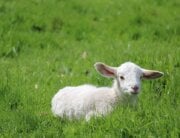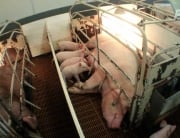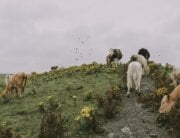Written by Joel Freedman, a PETA supporter for more than 30 years
Originally published in Finger Lake Times
Former Argentine Cardinal Jorge Bergoglio is now Pope Francis I. He chose the name in honor of Saint Francis of Assisi (1182-1226), who founded an order of non-materialistic friars who ministered to the poor and downtrodden. At his installation Mass, Pope Francis said he recognized his role, as leader of the world’s 1.2 billion Catholics, to protect “the hungry, the stranger, the naked, the sick and those in prison,” and other vulnerable people.
Saint Francis is also a patron saint of animals. He returned caught fish to their streams, fed bees in winter and freed animals caught in traps. A 13th century painting shows Saint Francis preaching to birds. He envisioned the world of nature as a mirror in which one can see God’s reflection. He wrote “The Canticle of the Sun,” urging people to respect the natural world as God’s handiwork, and to be protective of all God’s creatures.
Saint Francis wrote, “If you have men who will exclude any of God’s creatures from the shelter of compassion and pity, you will have men who will deal likewise with their fellow men.”
In his homilies and encyclicals, Pope Francis’ words are also about kindness to animals. Some excerpts: “It is contrary to human dignity to cause animals to suffer or die needlessly … Each organism, as a creature of God, is good and admirable … Jesus says of the birds of the air that not one of them is forgotten before God. How then can we mistreat them or cause them harm? … We must forcefully reject the notion that our being created in God’s image and given dominion over the Earth justifies absolute domination over other creatures …”
But does Pope Francis practice what he preaches? It is disappointing that Francis hasn’t said or done anything to stop vivisection and dissection of animals at Catholic universities or schools, or to stop bullfighting or the abuse of animals at patron saints celebrations in some predominantly Catholic faith nations — even when these abuses occur on church property.
Bullfighting involves smearing petroleum jelly in bulls’ eyes, stabbing them, and when they have fallen but are still conscious, cutting off their ears, hooves and tails. In order to impair their ability to defend themselves bulls are subjected to pre-fight tortures that include shaving down their horns, sticking needles into their genitals, and applying burning chemicals to their legs.
Every year in Spain, there are 10,000-20,000 patron saints celebrations that include live chicken beheading contests; throwing goats from church towers and drowning them if they survive the fall; beating and otherwise tormenting bulls as they are chased through the streets (“The Running of the Bulls”); setting live bulls’ horns on fire — thus burning their eyes and faces as they thrash around blindly in agony and terror; suspending live pigeons and squirrels in pots which are then pelted with stones; forcing horses to run through huge bonfires.
In Brazil, the Farra Do Boi Festival (“fun with oxen”) is celebrated by people who chase and torture oxen. Their legs are hacked off, their chests slit open, their eyes gouged out, their tails chopped off; sometimes the oxen are doused with petrol and set on fire. At the Yaurar Fiesta in Peru, a condor is tied to the back of a bull. Either the condor dies trying to get loose, or the condor kills the bull. In the event the bull survives, the people will then kill [him].
These kinds of cruel religious festivals, that take place in Spain, Portugal, France, Mexico, Venezuela, Brazil, Columbia, Peru, Ecuador and other predominantly Catholic nations, sometimes occur under the blessing of a local priest. Even when priests and bishops in these countries would like to stop bullfighting and tormenting of animals in the name of a patron saint, they usually remain silent — especially when the Church leadership in Rome has failed to condemn such horrific cruelty in countries where the Church has great influence.
Sixteenth-century Pope Pius V threatened excommunication for those who participated in or supported bullfighting or religious celebrations involving animal abuse. He was the only pope to take such actions. Pope Francis is adhering to a long-standing tradition of non-interference in these matters. Greatest need is for Francis to do more than “talk the talk” about the importance of kindness to animals. He needs to “walk the walk” by forcefully and decisively doing everything in his powers to stop this repulsive cruelty. I believe that most Catholics world-wide would be grateful for the pope’s intervention to end these medieval and barbaric practices. In fact, many Catholic animal rights advocates have tried — so far, unsuccessfully — to persuade Pope Francis to truly become the animals’ pope, and to prompt the Church to do much more than it has done on behalf of animals subjected to the horrors described in this essay.
Sister Helen Prejean is a Catholic nun known around the world for befriending death row inmates as well as ministering to victims of violent crimes. Her worthwhile endeavors played a major role in shaping the Catholic Church’s now vigorous opposition to capital punishment. I have read her three books: “Dead Man Walking: An Eyewitness Account of the Death Penalty in the United States;” “The Death of Innocents: An Eyewitness Account of Wrongful Executions;” and her more recent book, “River of Fire: My Spiritual Journey.”
Prejean describes herself as a progressive nun supportive of the Church’s endeavors to be as humanistic and humane as possible, but she does not mention any of the Church-related cruelty to animal issues described in this essay — even though she wrote that she is learning from Native Americans to recognize God’s spirit “in everything — land, trees, rivers, animals,” and that all God’s creations are entitled to moral consideration.
I admire Prejean for her human welfare endeavors, but animals subjected to cruelty and injustice also need people like her to advocate for them, by vigorously pressuring the Church leadership to end systemic cruelty to animals especially in places where the Church is powerful enough to make a difference.






